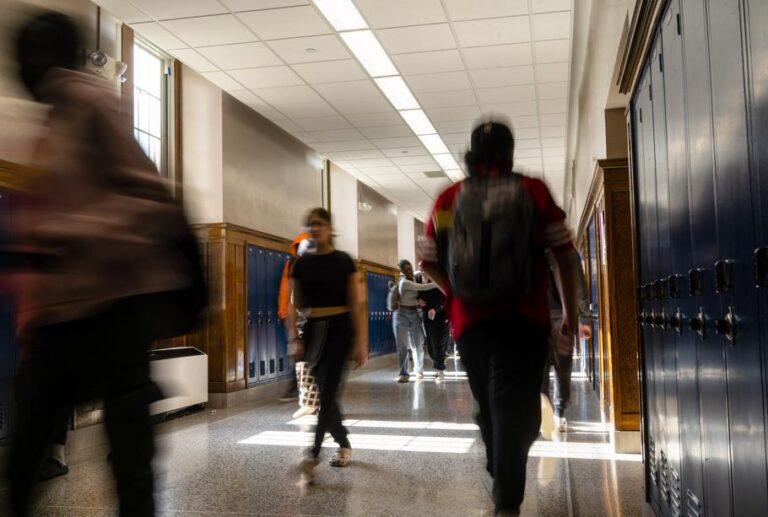CONCORD, N.H. — A federal judge in New Hampshire issued a preliminary injunction on Thursday blocking the Trump administration from following through on threats to defund schools that defy its directives on diversity, equity, and inclusion.
In an 82-page order, Chief Judge Landya B. McCafferty said the administration’s anti-DEI interpretation of federal law, as expressed in a letter the US Department of Education distributed in February, fails to give teachers clarity about what exactly the government requires of them.
“When a law fails to provide ‘minimal guidelines’ governing its enforcement, it may sweep in so much conduct that enforcement decisions become based on the ‘personal predilections’ of the person or entity bringing the enforcement action,’’ she wrote, ruling that the plaintiffs are likely to succeed in proving the directives are unconstitutionally vague.
McCafferty wrote that the February letter, in combination with the Education Department’s public statements about it and the launch of an “End DEI’’ portal, “raise the specter of a public ‘witch hunt’ that will sow fear and doubt among teachers lest they be publicly branded as peddlers of ‘divisive ideologies’ based on the Department’s — or even private parties’ — subjective assessments.’’
What’s more, teachers would face the risk of professional consequences whether they comply with the federal government’s anti-DEI directives or not, she added. The certification requirements for English teachers in New Hampshire, for example, require educators to consider literature “through various critical lenses,’’ such as gender, ethnicity, religion, or socioeconomic conditions, she noted.
The injunction was one of several judicial actions on Thursday targeting Trump administration actions.
A federal judge temporarily blocked election officials from implementing parts of President Trump’s executive order to require people to prove they are citizens when they fill out federal voter registration forms.
The sweeping order Trump signed last month sought to overhaul how the 2026 midterm elections are run, even though the Constitution says voting policies are to be set by the states and Congress. Democrats and voting rights groups quickly sued, leading to Thursday’s preliminary injunction.
“Our Constitution entrusts Congress and the States — not the President — with the authority to regulate federal elections,’’ Judge Colleen Kollar-Kotelly of the US District Court for D.C. wrote in her opinion.
Meanwhile, a federal judge in Maryland has ordered the Trump administration to return a Venezuelan man who was sent to a megaprison in El Salvador, despite being part of a class action settlement that should have protected him from removal.
US District Judge Stephanie said Wednesday that other migrants covered by the settlement should also be shielded from deportation or transfer to El Salvador until their asylum cases are processed.
The case marks the second time a judge has ordered the Trump administration to return a migrant it sent to El Salvador on March 15.
The first was Kilmar Abrego García, a Salvadoran immigrant who received from an immigration judge in 2019 a “withholding of removal’’ order preventing his deportation and yet was sent to El Salvador. The Trump administration later acknowledged he was deported in error but has not yet returned him.
In New Hampshire, the lawsuit related to Trump’s move against DEI programs in schools was first filed by attorneys with the National Education Association and the American Civil Liberties Union, who allege the administration is violating the due process and free speech rights of teachers.
Sarah Hinger, deputy director of the ACLU’s racial justice program, hailed Thursday’s ruling as a win for academic freedom.
“Every student deserves an education that reflects the full diversity of our society, free from political interference,’’ Hinger said in a statement. “The federal government has no authority to dictate what schools can and cannot teach to serve its own agenda, and this ruling is an important step in reaffirming that.’’
The Center for Black Educator Development and six public school districts in New Hampshire and Vermont have since agreed to sign on as plaintiffs as well.
State education commissioners were given until Thursday to submit certifications that their schools are complying with the federal government’s interpretation of the law, but McCafferty’s ruling bars the administration from proceeding with that certification requirement. It also bars the government from using its “End DEI’’ portal as planned.
The New Hampshire Department of Education required school districts and public charter schools to submit their certifications by last week, and most have done so, according to a list published on the state’s website.
Rather than issue a nationwide injunction, McCafferty said the protections in her order apply to the plaintiffs in this case, their members, and “any entity that employs, contracts with, or works with’’ at least one member of the plaintiff organizations.
The NEA alone reports having 3 million members employed in a wide variety of educational settings, so McCafferty’s order could apply to a broad swath of entities.
The government is expected to pursue an appeal.
Material from wire services was included in this report.
Steven Porter can be reached at steven.porter@globe.com. Follow him @reporterporter.


